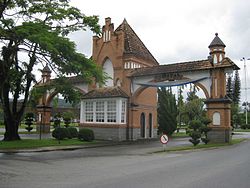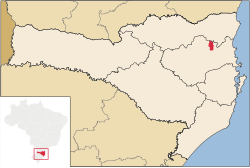Pomerode: Difference between revisions
Motto Tags: Mobile edit Mobile web edit |
change link |
||
| Line 4: | Line 4: | ||
|native_name = <!-- Uma cidade que fica em Santa Catarina--> |
|native_name = <!-- Uma cidade que fica em Santa Catarina--> |
||
|nickname = A cidade mais alemã do Brasil<br><small>(The most German city in Brazil)</small> |
|nickname = A cidade mais alemã do Brasil<br><small>(The most German city in Brazil)</small> |
||
|motto = "Unser Kleines Deutschland"([[German]])<Br>"Nossa Pequena Alemanha"([[Portuguese]])<br><small>(Our Little Germany) |
|motto = "Unser Kleines Deutschland"([[German]])<Br>"Nossa Pequena Alemanha"([[Portuguese language|Portuguese]])<br><small>(Our Little Germany) |
||
|image_skyline =PomerodeNorthGate.jpg |
|image_skyline =PomerodeNorthGate.jpg |
||
|imagesize = 250px |
|imagesize = 250px |
||
Revision as of 16:34, 23 July 2019
Pomerode | |
|---|---|
 North gate in Pomerode | |
| Nickname(s): A cidade mais alemã do Brasil (The most German city in Brazil) | |
| Motto(s): | |
 Location of Pomerode | |
| Coordinates: 26°44′27″S 49°10′37″W / 26.74083°S 49.17694°W | |
| Country | |
| Region | South |
| State | |
| Founded | January 21, 1959 |
| Government | |
| • Mayor | Ercio Kriek |
| Area | |
• Total | 215.904 km2 (83.361 sq mi) |
| Population (2015) | |
• Total | 25,000[1] |
| • Density | 114/km2 (300/sq mi) |
| Time zone | UTC-3 (UTC-3) |
| • Summer (DST) | UTC-2 (UTC-2) |
| HDI (2010) | 0.780 |
| Website | www.pomerode.sc.gov.br |
Pomerode (Portuguese: [pomeˈɾodɪ]) is a Brazilian municipality in the state of Santa Catarina, in Southern Brazil. It is located in the valley of the Itajaí-Açu river, not very far from the city of Blumenau, one of the largest cities in the state.
Pomerode is known as the most German city in Brazil, because the vast majority of its inhabitants are of German descent and are bilingual in German and Portuguese.[2]
History and the local language
Pomerode was founded by Pomeranian Germans in 1861 and is considered the "most typically German of all German towns of southern Brazil".
One very remarkable characteristic about Pomerode is the fact that 90% of its residents speak German,[1] more specifically the East Pomeranian dialect.[3][4]
In Pomerode, as in some other localities in southern Brazil (Santa Maria de Jetibá, Espírito Santo, among them), the German language is not a foreign language, but a Brazilian linguistic regionalism.
For a good part of the 20th century, the Brazilian government did not encourage people to speak German. At times it was actively repressed and prohibited, as during Getúlio Vargas's presidency. Today, after a long period of suppression, German is part of the curriculum in local schools and tolerated if not always encouraged by regional governments throughout southern Brazil.
East Pomeranian (not to be confused with Slavic Kashubian which is in English called Pomeranian) is spoken by most town inhabitants of Pomerode, along with Portuguese, mainly by younger people. German-extraction Brazilians who are still bilingual speak the dialect of the regions they came from. In Santa Catarina this is Northern Germany, from Bremen to Danzig. In Rio Grande do Sul it is from the Hunsrück area south-west of Frankfurt and substantially different, at least to Germans.
The town government uses "Pomeroy" as the English translation of the town's name on its website, despite being etymologically incorrect.[citation needed]
Ethnic composition
| Race/Skin color | Percentage | Number |
| Whites | 92.01% | 25,542 |
| Pardos (brown) | 7.19% | 1,996 |
| Blacks | 0.61% | 169 |
| Asian | 0.14% | 38 |
| Amerindians | 0.05% | 13 |
Religion
| Religion | Percentage | Number |
| Catholics | 31.17% | 6,896 |
| Protestants | 66.39% | 14,690 |
| No religion | 0.98% | 217 |
| Kardecists | 0.13% | 29 |
Lutherans are 63.76% of the population, although German Pomerania used to be a part of the United Churches. Over time, some of the Pomeranians converted to Catholicism, and Catholics from the rest of Brazil moved into the town.
Tourism and economy

Pomerode has a long history developing its manufacturing industry like other cities in the region. It is also located in a very rich agricultural valley. Additionally, in the last few decades the creation and development of the tourist industry has become a priority. To accomplish that, great efforts are being made to reinforce and celebrate the pioneering roots of the local inhabitants.
The tourist industry of nearby Blumenau (about 30 km (19 mi) away) is very well developed attracting hundreds of thousands of visitors annually to its festivals such as Oktoberfest of Blumenau, the largest one in the world after the original festival in Munich. Naturally, this has generated a very positive impact on the tourist industry of much smaller Pomerode.
In addition to tourism the economy is dependent on industry, which includes knitted clothing, plastic articles, state of the art metal and mechanical industries, garments and cloth, and furniture.
References
- ^ a b Perry, Francesca (2 October 2015). "What are the most 'emotionally stable' cities in the US?". theguardian.com. Retrieved 27 June 2016.
- ^ "Turismo Virtual - TV Online". turismovirtual.com.br. Retrieved 27 June 2016.
- ^ Gippert, Jost. "TITUS Didactica: German Dialects (map)". titus.uni-frankfurt.de. Retrieved 14 April 2018.
- ^ "Pommern in Brasilien - LernCafe – Online-Journal zur allgemeinen Weiterbildung". www.lerncafe.de. Retrieved 14 April 2018.
- ^ "Sistema IBGE de Recuperação Automática - SIDRA". ibge.gov.br. Retrieved 27 June 2016.
- ^ "Sistema IBGE de Recuperação Automática - SIDRA". ibge.gov.br. Retrieved 27 June 2016.
External links
- Pomerode's official website. Accessed on April 16, 2006.Template:Pt icon
- Portal Pomerodense. In Portuguese, interactive map about the city.
- Travel Guide: Pomerode. In English, accessed on April 16, 2006.
- Pomerode in Pictures. Visual content, accessed on April 16, 2006.



